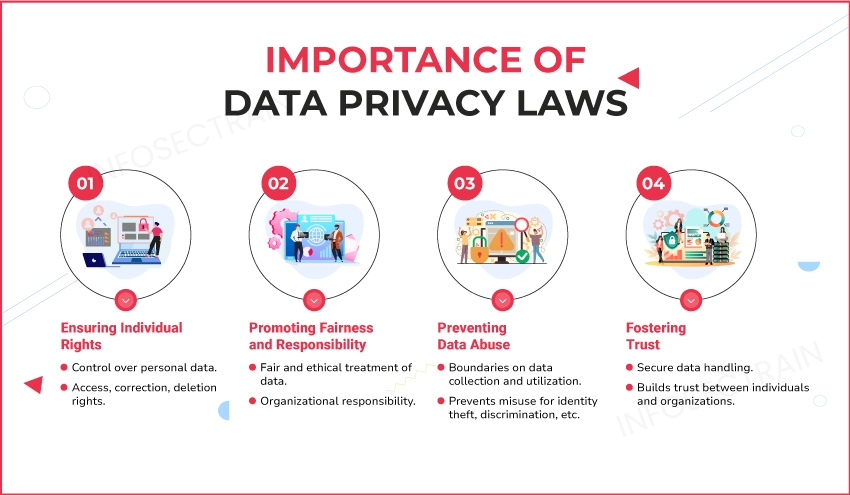Top 5 Data Privacy Laws
Given the significant value of personal data in today’s digital era, data privacy has emerged as a crucial concern. Governments worldwide have made safeguarding individuals’ privacy a top priority, resulting in the implementation of stringent data privacy regulations. These regulations are crucial in preserving citizens’ rights and instilling trust in the digital environment. From Europe to Asia and beyond, numerous nations have enacted comprehensive laws governing personal data collection, processing, and storage.

What are Data Privacy Laws?
Data privacy laws are regulatory measures crafted to safeguard individuals’ personal information against unauthorized access, utilization, and disclosure by organizations and governmental bodies. These laws establish guidelines for collecting, processing, and storing data, granting individuals rights over their own data. They aim to promote transparency, accountability, and trust in handling personal information, ensuring that privacy rights are upheld in an increasingly digital world. Adherence to these laws is crucial for businesses to evade legal repercussions, preserve customer trust, and uphold ethical norms in data management protocols.
Top 5 Data Privacy Laws
1. General Data Protection Regulation (GDPR):
The General Data Protection Regulation (GDPR), implemented by the European Union (EU) in 2018, stands out as one of the most extensive data privacy laws worldwide. It pertains to any entity processing the personal data of EU residents, regardless of its location. Emphasizing principles like data minimization, purpose limitation, and transparency, the GDPR grants individuals significant control over their data, including rights to access, rectify, and erase personal information.
2. Indian Data Privacy Law (Personal Data Protection Bill):
India’s forthcoming Personal Data Protection Bill seeks to regulate the processing of personal data within the country. Inspired by the GDPR, this bill aims to set principles for data processing, define individuals’ rights, and impose responsibilities on data fiduciaries. It introduces the concept of data localization, mandating that certain sensitive personal data must be stored solely within India. The bill also proposes the establishment of a Data Protection Authority to supervise compliance and enforcement efforts.
3. California Consumer Privacy Act (CCPA):
Enacted in 2020, the California Consumer Privacy Act (CCPA) is renowned as one of the most stringent data privacy laws in the United States. It gives California residents increased control over their personal information held by businesses. The CCPA grants consumers the right to be informed about the data being collected, the right to opt out of their data being sold, and the right to request the deletion of their information. This law applies to businesses meeting specific criteria, regardless of their physical location in California.
4. Brazilian General Data Protection Law (LGPD):
Brazil’s LGPD, enacted in 2020 and inspired by the GDPR, represents a notable advancement in the nation’s data privacy framework. Applicable to both online and offline data processing activities conducted by public and private entities within Brazil, the LGPD affords individuals rights akin to those outlined in the GDPR, such as access, rectification, and deletion of their data. Additionally, the law mandates that data controllers establish security protocols to protect personal data from unauthorized access or disclosure.
5. Personal Information Protection Law of China (PIPL):
China’s Personal Information Protection Law (PIPL), passed in 2021 and scheduled for implementation in 2023, is anticipated to emerge as one of the most comprehensive data privacy legislations in the Asia-Pacific area. This law pertains to handling personal information within China’s borders and delivering products or services to Chinese individuals. It establishes rigorous standards for data processing, encompassing obtaining consent for data collection, enforcing data security protocols, and conducting risk assessments for high-risk processing operations.
Importance of Data Privacy Laws

1.Ensuring Individual Rights:
These laws give individuals authority over their personal data, including the right to understand what information is gathered, how it’s utilized, and the ability to access, correct, or, in certain instances, delete it.
2. Promoting Fairness and Responsibility:
Data privacy laws advocate for fair and ethical treatment of data. They hold organizations responsible for their data management practices, lowering the likelihood of discrimination or prejudice based on personal information.
3. Preventing Data Abuse:
Data privacy laws establish boundaries on organizations’ collection, utilization, and dissemination of personal data. This prevents data misuse for harmful purposes such as identity theft, discrimination, or targeted advertising without consent.
4. Fostering Trust:
Robust data privacy laws promote trust between individuals and organizations. People who believe their data is secure and treated with respect are more willing to engage online and share information.
Conclusion
Data privacy has become essential for businesses in a globalized world as the digital landscape evolves. By complying with laws like the GDPR, CCPA, Indian Data Privacy Law, Brazilian LGPD, and China’s PIPL, organizations can reduce risks, establish consumer trust, and promote responsible data management. Given the growing importance of data privacy, businesses must stay updated with regulations and implement strong privacy practices to protect individuals’ rights in the digital age.
Data Privacy Training with InfosecTrain
InfosecTrain offers a range of Data Privacy training programs designed to mentor individuals into adept professionals in the ever-evolving realm of data privacy. These courses comprehensively address diverse facets of data privacy, offering extensive insights into laws, regulations, and best practices. Emphasizing practical learning, the courses empower participants with theoretical understanding and practical skills essential for excelling in data privacy. Through hands-on experience, individuals gain proficiency and confidence in navigating complex data privacy challenges, ensuring they are well-prepared to safeguard sensitive information effectively.







 1800-843-7890 (India)
1800-843-7890 (India)